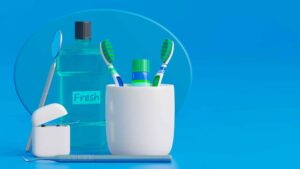When you recover from a cold, you might forget about one small yet crucial task: replacing your toothbrush. At Krishees Dental, we emphasize the importance of maintaining good oral hygiene, especially after an illness. Replacing your toothbrush after a cold can significantly impact both your oral health and overall well-being. Let’s explore why this simple step matters and how it helps you maintain a healthy mouth.
Why You Should Replace Your Toothbrush After a Cold
Replacing your toothbrush after a cold might seem unnecessary, but it plays a key role in your recovery. Here are the main reasons to replace your toothbrush:
1. Germs Linger on Your Toothbrush
During a cold, viruses and bacteria can spread throughout your body, including your mouth. Even though brushing helps clean your teeth, your toothbrush bristles can retain these germs. They can survive on your toothbrush and reinfect you once you start using it again.
2. Prevent Reinfection
After a cold, your immune system is still recovering. Using a toothbrush contaminated with the same bacteria or viruses that made you sick can cause you to catch the illness again. Replacing your toothbrush ensures that you don’t risk reinfecting yourself.
3. Keep Your Oral Health in Top Shape
Maintaining good oral hygiene is crucial, especially after being sick. A clean toothbrush will help you avoid additional oral health issues like gum disease or cavities. By replacing your toothbrush, you continue to protect your mouth and teeth from harmful bacteria.
When Should You Replace Your Toothbrush After a Cold?
It’s best to replace your toothbrush immediately after you recover from a cold. If your toothbrush bristles are worn out or frayed, consider replacing it sooner. Worn-out bristles are less effective at cleaning your teeth and gums, so always ensure your toothbrush is in good condition.
The Risks of Not Replacing Your Toothbrush
Failing to replace your toothbrush after a cold can lead to several issues:
Prolonged Illness: The bacteria and viruses that linger on your toothbrush can cause your cold to last longer.
Poor Oral Health: Using a contaminated toothbrush may cause additional oral health problems such as cavities or gum infections.
Weakened Immune System: After fighting off a cold, your immune system is still vulnerable. Reusing a contaminated toothbrush can weaken your body’s defenses.


How to Care for Your Toothbrush
While replacing your toothbrush after a cold is essential, it’s also important to care for your toothbrush regularly. Here are some tips to keep your toothbrush clean:
1. Rinse Thoroughly After Each Use
Always rinse your toothbrush with hot water after brushing to remove toothpaste and food particles. This helps reduce the amount of bacteria on the bristles.
2. Store It Properly
Avoid storing your toothbrush in a closed container or allowing it to sit in a damp environment. Store it upright in a dry place, which will help prevent the growth of bacteria.
3. Replace Every 3-4 Months
You should replace your toothbrush every 3-4 months, or sooner if the bristles appear worn out. Keeping your toothbrush in good condition ensures that you continue to get the best cleaning results.
4. Don’t Share Your Toothbrush
Sharing a toothbrush may seem harmless, but it can lead to the spread of germs. Always use your own toothbrush to avoid cross-contamination, especially after being sick.
Why Oral Hygiene Matters After a Cold
Maintaining good oral hygiene after a cold is crucial for your overall health. Here’s why you should continue to prioritize your oral care:
1. Prevent Further Health Problems
If you don’t replace your toothbrush or practice good oral hygiene after a cold, you risk developing other health issues. For example, the bacteria left on your toothbrush can cause gum disease or cavities, making it harder for you to recover fully.
2. Strengthen Your Immune System
Good oral hygiene plays a significant role in your immune health. A clean mouth prevents harmful bacteria from entering your bloodstream, which can help you recover faster and stay healthier.
3. Freshen Your Breath and Smile
After a cold, you may notice your breath isn’t as fresh. Replacing your toothbrush and brushing regularly will help restore a clean, fresh mouth. A healthy smile is a sign of overall well-being, and replacing your toothbrush helps you keep it that way.


Why Choose Krishees Dental for Your Oral Care?
At Krishees Dental, we believe that good oral hygiene is key to your overall health. We don’t just provide top-notch dental services; we also educate our patients on the best practices for maintaining a healthy mouth. From brushing techniques to toothbrush care, our team is always here to offer guidance and support.
Our friendly and experienced staff at Krishees Dental is dedicated to helping you achieve a healthy smile, whether it’s through regular checkups, cleanings, or personalized advice on how to take care of your oral health after a cold.
Conclusion
Replacing your toothbrush after a cold is a small but important step toward protecting your health. By getting rid of harmful germs and bacteria, you prevent reinfection and promote better oral hygiene. Krishees Dental is here to guide you through your oral health journey, helping you maintain a clean, healthy mouth after a cold or at any time.
FAQs
1. How often should I replace my toothbrush?
Replace your toothbrush every 3-4 months, or sooner if the bristles are frayed. After being sick, always replace it immediately.
2. Can I disinfect my toothbrush instead of replacing it?
While disinfecting your toothbrush can help remove some bacteria, it’s best to replace it after a cold. A new toothbrush ensures you won’t reintroduce harmful germs.
3. What’s the best type of toothbrush to use after a cold?
A soft-bristled toothbrush is ideal, as it’s gentle on your gums. Electric toothbrushes are also effective in removing bacteria and plaque.
4. Can using a dirty toothbrush cause reinfection?
Yes, using a toothbrush that still contains germs from your cold can lead to reinfection and prolong your illness.
5. How can I keep my toothbrush clean after a cold?
Rinse your toothbrush thoroughly after every use, store it in a dry area, and replace it after a cold to prevent reinfection.


Leave a Reply